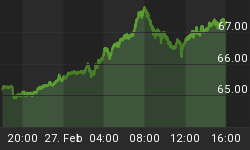China, India and Russia are accumulating a lot of gold, but they're virtually alone. Traditional money managers, for a variety of reasons, view the metal as neither a viable investment (because it doesn't pay interest) nor a substitute for cash (because they don't understand monetary history).
But what if they changed their minds? From Chapter 21 of The Money Bubble: What To Do Before It Pops:
The fact that the East stands ready to buy all their gold at late-2013 exchange rates presents developed-world central banks with a dilemma: They can continue their manipulation, in which case they will soon run out of metal. Or they can step back - like they did when the London Gold Pool collapsed in 1968 - and let market forces choose an exchange rate, which will almost certainly be far higher than at present.
To understand how quickly and dramatically the latter scenario might play out, consider the current asset base of the money management industry. Most of the world's approximately $100 trillion of liquid wealth is overseen by mutual funds, hedge funds, insurance companies, sovereign wealth funds and pension funds. And they own virtually no gold.
Shayne McGuire, head of global research at the Teacher Retirement System of Texas, estimates that pension funds, for instance, have allocated about 1/3 of one percent of their $30 trillion of assets to gold. If they were to up their exposure to just one percent (still extremely low) that would represent new demand for about $200 billion worth of gold, or about 4,700 tonnes at the metal's late-2013 exchange rate. That's more than 5-times the weight of gold that now resides in GLD, the biggest gold ETF, and about 125 percent of the late-2013 market capitalization of the entire gold mining sector. If pension funds allocate five percent of their assets to gold - which is still modest when viewed against historical records - the resulting $1.4 trillion increase in demand would overwhelm the market, virtually guaranteeing the kinds of defaults and shortages that almost took place in early 2013.
And that's just pension funds. The other institutional investors mentioned above have $70 trillion under management and also own very little gold. A one-percent swing in their allocation would send another $700 billion into this small, thin, already-out-of-balance market, further destabilizing it.
This shift in demand alone would be enough to change the industry's perspective on gold from "ignore" to "get some before the quarterly reporting deadline." Toss in a default by a major metals exchange or an announcement by China that its reserves are actually 4,000 tonnes and it intends to back the yuan with gold and use it instead of the dollar for international trade, and the combination of renewed interest in gold and loss of faith in the dollar would send the gold/dollar exchange rate soaring.















